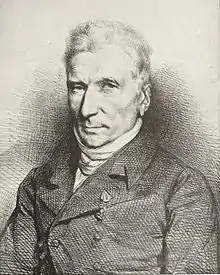Guy de Gisors
Alexandre-Jean-Baptiste-Guy de Gisors (20 September 1762 – 6 May 1835) was a French architect, a member of the Gisors family of architects and prominent government administrators responsible for the construction and preservation of many public buildings in Paris.[1]

Early training and family
Guy de Gisors was born in Paris, where he attended the Académie Royale d’Architecture and was a student of Jean Chalgrin. He was the cousin of Jacques-Pierre Gisors (1755–1818) and the uncle of Alphonse de Gisors (1796–1866), and collaborated with Jacques-Pierre on the design of the assembly hall for the Conseil des Cinq-Cents in the Palais-Bourbon (1795–1797).[1]
Later career
He participated in the planning of Napoléonville in 1808[1] and in about 1810 took over the ongoing designs for the Piazza del Popolo in Rome, succeeding Giuseppe Valadier and adhering to Valadier's grand plan.[2] However, his most important work was the design of the Saint-Vincent Cathedral in Mâcon in 1816.[1]
Administrative positions included Architecte du Corps Législatif et des Archives Nationales (1811), Inspecteur Général des Bâtiments Civils (1811–1832), Architecte des Casernes des Sapeurs-Pompiers de Paris (1824–1831), member of the Conseil Consultatif des Bâtiments de la Couronne (1825–1830) and architect (1831–1835) to Louis-Philippe.[1]
Guy de Gisors died in Paris.[1]
References
- Richard Cleary (1996). "Gisors", vol. 12, pp. 746–747, in The Dictionary of Art, edited by Jane Turner, reprinted with minor corrections in 1998. New York: Grove. ISBN 9781884446009.
- Allison Lee Palmer (2011). Historical Dictionary of Neoclassical Art and Architecture, p. 225. Scarecrow Press. ISBN 9780810874749. Preview of p. 225 at Google Books.
External links
| Wikimedia Commons has media related to Alexandre Jean-Baptiste Guy de Gisors. |
- "Town of Mâcon" at the Wayback Machine (archived 14 April 2008), originally at http://pagesperso-orange.fr/richez/Burgundy/Macone.htm
- Alexandre Jean-Baptiste Guy de Gisors at Structurae